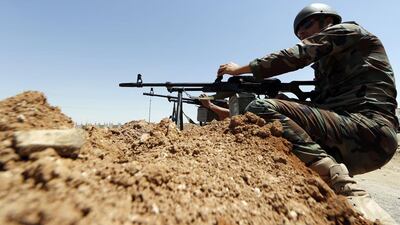ERBIL // An offensive by an Al Qaeda splinter group that threatens to divide Iraq has presented a long sought after prize to the country’s Kurdish minority: Kirkuk.
Forces from Iraq’s semi-autonomous Kurdish area to the north on Thursday seized control of Kirkuk, which they claim as their historical capital.
The Kurdish fighters, known as the Peshmerga, say they took over to defend Kirkuk after Baghdad’s military crumbled in the face of a lightning assault by the Islamic State in Iraq and the Levant (ISIL) and fellow Sunni militants. Iraqi soldiers say the Kurds ordered them to leave.
Kirkuk’s governor, Najmaldin Karim, said on Thursday that he asked the Peshmerga to “come and defend most of Kirkuk from the insurgents” because “the army fled”. The rapid collapse of the country’s military against the ISIL offensive, driven by Sunni-Arab anger at the Shiite-led government of the prime minister Nouri Al Maliki, has allowed militants to capture vast swathes of territory including Iraq’s second-largest city, Mosul.
Whatever the case, analysts say Kurdish control of Kirkuk risks angering Iraq’s neighbours and aggravating domestic sectarian feuds.
The move may inflame separatist sentiment among Kurds who form large minorities in adjoining areas of Turkey, Syria and Iran. That would likely make it far more difficult for Kurdish leaders to cede Kirkuk and its large oil deposits to the government in Baghdad – that is, if it survives the ISIL onslaught, said Wladimir van Wilgenburg, an expert on Iraq’s Kurds and columnist for the US-based Al Monitor website.
“It will mean that the Iraqi state has lost Kirkuk forever,” he said.
Ethnically and linguistically distinct from Iraq’s primarily Arab communities of Shiites and Sunnis, Kurds form close to 20 per cent of the country’s population of more than 32 million people.
The Kurds’ long-standing desire for independence has been fuelled by a history of repression, particularly in Iraq, where they have faced military assaults and chemical weapons attacks under the former dictator Saddam Hussein that rights groups have called acts of genocide. Under a policy of Arabisation, Saddam drove scores of Kurds from their homes in such strategic areas as Kirkuk.
The semi-autonomous Kurdistan Regional Government (KRG) became a federal entity after the 2003 US invasion that deposed Saddam, with its seat in Erbil and authority over a mountainous homeland with an estimated 45 billion barrels of oil. But its remit does not officially include Kirkuk, which is the capital of the Kirkuk governorate that has an oilfield with about 10 billion barrels of proven reserves.
“If things unfold with the disintegration and partitioning of Iraq, you can bet that the Kurds will do their best to make Kirkuk part of their homeland,” said Labib Kamhawi, an independent political analyst in Amman.
With Iraq’s future territorial integrity increasingly in question, Hilal Khashan, professor of political science at the American University in Beirut, said the Kurd’s seizure of the city augurs more ambitious steps.
“This is a prelude to declaring statehood.”
In an attempt to reverse Saddam’s policies, the Kurds have over the past decade pushed for de facto political and economic control in Kirkuk and are believed to form a majority of the city’s population, which is estimated to be more than 500,000. That has raised tension with Arab and Turkmen residents, while a referendum on the area’s status that was planned after 2003 was never held.
Mr Khashan said the Kurdish move on Kirkuk also had irked Turkey, which has faced a domestic insurgency by Kurdistan Workers Party (PKK) separatists. Turks also have historical claims to the city and surrounding areas that came under British control after the collapse of the Ottoman Empire during the First World War. Although the 1920 Treaty of Sevres on the division of the empire after the war included a provision for a Kurdish state, this was dropped in the 1923 Tretay of Lausanne that superseded it.
Despite growing ties with the KRG since 2003, including huge investments in everything from luxury stores to construction as well as deal to receive oil piped in from the area, Ankara would not hesitate to oppose Kurdish moves to claim Kirkuk, Mr Khashan said.
“The Turks have interests in Iraqi Kurdistan, yet they can’t accept the takeover of Kirkuk by Peshmerga,” he said.
Lina Khatib, director of the Carnegie Middle East Centre in Beirut, said the seizure of Kirkuk was largely meant to shore up Kurdish defences against ISIL attacks. But that could change.
“As the rest of Iraq faces the serious prospect of disintegration, Kurds feel the need to hold their areas and may well eventually push for independence from what might become a failing Iraqi state, or at least, a state without legitimacy in the eyes of a large proportion of its population – the Sunnis,” she said.
Riad Kahwaji, the chief executive of the Institute for Near East and Gulf Military Analysis, said ISIL militants would likely think twice before attempting to invade Kurdish areas. Kurdish fighters are well trained in mountain-guerrilla warfare after waging years of uprisings, and they are heavily armed with Soviet-made weaponry, including tanks and Grad rockets.
He estimated the Peshmerga could mobilise a force of 200,000.
“They are definitely much better organised and structured than the Iraqi army and they would pose a significant foe to ISIL,” Mr Kahwaji said.
hnaylor@thenational.ae

